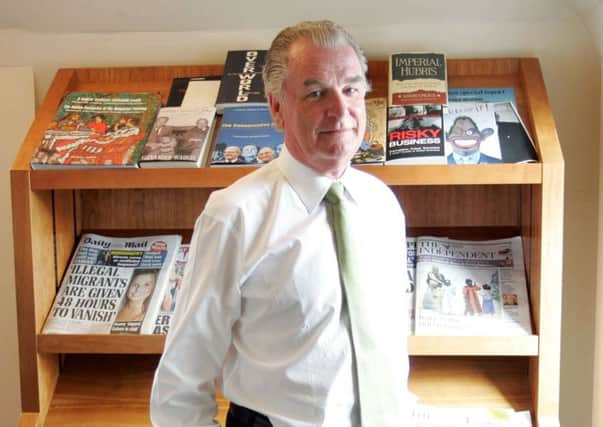Obituary: Lord Bell, controversial PR man behind Thatcher’s ‘Labour isn’t working’ campaign


Tim Bell was the PR brains, the image-maker and damage-limitation expert behind some of the most controversial and downright dodgy characters of the 20th century, including the Chilean dictator General Pincohet, the Belarussian dictator Alexander Lukashenko and, most notably, Margaret Thatcher.
His work for the Conservative Party is widely regarded as having played a vital role in successive election victories in 1979, 1983 and 1987. He was managing director of Saatchi and Saatchi when they came up with the famous “Labour isn’t working” poster campaign, showing what looked like a very long dole queue, snaking off into the distance.
Advertisement
Hide AdAdvertisement
Hide AdDenis Healey accused the Conservatives of “selling politics like soap powder”; it was revealed that the people on the poster were not unemployed, but Hendon Young Conservatives and there were only about 20 of them, with the same people repeated over and over again.
But Tory treasurer Lord Thorneycroft reckoned the poster won them the election and it was voted Poster of the Century in Campaign magazine, though Bell later revealed that Thatcher did not understand the double meaning.
Despite her lack of understanding, or maybe because of it, Thatcher held Bell in very high regard and regarded him as a personal friend. He was bright, charming, loyal, energetic, positive, can-do. At heart he was a Right-winger, a capitalist, distrustful of liberal intellectuals, and not overly bothered with details or facts – in some ways a man ahead of his time.
Thatcher invited him to family Christmas dinners, though he regarded them as very dull, with no presents or games, and everyone had to sit in silence and show due respect during the Queen’s televised message.
Many other senior Tories, including Norman Tebbit and Thatcher’s press secretary, Bernard Ingham, were less enamoured with Bell. A Machiavellian character, he did not think normal rules of behaviour and ethical standards applied to him. He boasted of lying and making up research to back up his messages. In 1977 he was convicted of indecency for masturbating at his front window, reportedly “in full view of female passers-by” (and presumably male passers-by too).
He set up Bell Pottinger in 1998 and it became the largest PR agency in the UK, working for controversial foreign regimes that were prepared to pay huge sums for positive professional PR.
Newspaper exposes claimed the agency rewrote Wikipedia entries and attempted to “drown out” reports of human rights abuses on the internet.
But the PR industry was growing increasingly sensitive to criticism of malpractice and lack of ethics. Bell left his own agency in 2016, though he retained a stake, and the agency was expelled from the Public Relations and Communications Association the following year for unethical interference in South African affairs.
Advertisement
Hide AdAdvertisement
Hide AdSome mystery surrounds his appearance on Newsnight, supposedly to defend Bell Pottinger, but widely regarded as putting the final nail in the agency’s coffin. He fumbled answers and his mobile phone rang twice.
He said he was not involved in the deal at the centre of the controversy, but presenter Kirsty Wark quoted an e-mail that he had written, saying: “We will put forward a deal whereby we will earn £100,000 per month plus costs and I will oversee this.”
Some commentators called it inept for such a skilled communicator. Coincidentally, perhaps Bell was involved in a new rival agency.
For many years Bell maintained he had been born in Sydney, perhaps, as his unauthorised biographer, Mark Hollingsworth, suggested, in order to gain entrance to the higher echelons of class-ridden British society. In reality, Timothy John Leigh Bell was born nowhere more exotic than London, though his mother was from Australia and his father from Ireland.
His father was an alcoholic Crosse & Blackwell sales representative who walked out when Bell was four, moved to South Africa and became a minor radio celebrity under the name Uncle Paddy.
Bell went to grammar school, but said he “didn’t fancy” university. “They wore duffle coats, smoked pipes and liked trad jazz, whereas I wore Italian suits and liked modern jazz,” he said, adding that he considered becoming a professional trumpet player, but felt that making money was more important.
During the 1960s he worked for several companies and advertising agencies, keen to move around and advance his career. He played rugby, although he also took cocaine and at one point smoked 80 cigarettes a day. He reputedly landed a job with the Colman, Prentis and Varley agency because they needed a winger for the works team.
He first met Thatcher in the 1960s when canvassing in Finchley and would later coach her on her image and delivery. The Daily Mail called him “The PR Mad Man who made Maggie”. It was Bell who announced her death in 2013.
Advertisement
Hide AdAdvertisement
Hide AdBell was in at the start of Saatchi and Saatchi in 1970 and served as managing director and chairman before moving on in the 1980s. He enjoyed the high life, having his chauffeur drive him 200 yards for lunch in an expensive restaurant.
Despite his skills at public relations and public image creation, it seems he did a lot of work for charity without ever blowing his own trumpet on that front, keeping “uncharacteristically quiet” as the Daily Telegraph put it.
Two marriages ended in divorce. He married again just two years ago.
In recent years Bell suffered from Parkinson’s disease and had a triple heart-bypass operation and a stroke. He is survived by his third wife, Jacky, and by two children from his second marriage.
He was knighted in 1991 and made a lord in 1998. His autobiography, published in 2014, was called Tim Bell – Right or Wrong.
Brian Pendreigh